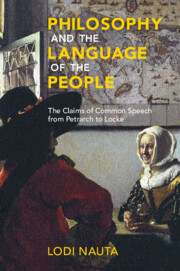Book contents
- Philosophy and the Language of the People
- Philosophy and the Language of the People
- Copyright page
- Contents
- Acknowledgments
- Introduction
- Chapter 1 Early Humanist Critics of Scholastic Language: Francesco Petrarch and Leonardo Bruni
- Chapter 2 From a Linguistic Point of View: Lorenzo Valla’s Critique of Aristotelian-Scholastic Philosophy
- Chapter 3 Giovanni Pontano on Language, Meaning, and Grammar
- Chapter 4 Juan Luis Vives on Language, Knowledge, and the Topics
- Chapter 5 Anti-Essentialism and the Rhetoricization of Knowledge: Mario Nizolio’s Humanist Attack on Universals
- Chapter 6 Skepticism and the Critique of Language in Francisco Sanches
- Chapter 7 Thomas Hobbes and the Rhetoric of Common Language
- Chapter 8 Between Private Signification and Common Use: Locke on Ideas, Words, and the Social Dimension of Language
- Conclusion
- Bibliography
- Index
Chapter 6 - Skepticism and the Critique of Language in Francisco Sanches
Published online by Cambridge University Press: 13 July 2021
- Philosophy and the Language of the People
- Philosophy and the Language of the People
- Copyright page
- Contents
- Acknowledgments
- Introduction
- Chapter 1 Early Humanist Critics of Scholastic Language: Francesco Petrarch and Leonardo Bruni
- Chapter 2 From a Linguistic Point of View: Lorenzo Valla’s Critique of Aristotelian-Scholastic Philosophy
- Chapter 3 Giovanni Pontano on Language, Meaning, and Grammar
- Chapter 4 Juan Luis Vives on Language, Knowledge, and the Topics
- Chapter 5 Anti-Essentialism and the Rhetoricization of Knowledge: Mario Nizolio’s Humanist Attack on Universals
- Chapter 6 Skepticism and the Critique of Language in Francisco Sanches
- Chapter 7 Thomas Hobbes and the Rhetoric of Common Language
- Chapter 8 Between Private Signification and Common Use: Locke on Ideas, Words, and the Social Dimension of Language
- Conclusion
- Bibliography
- Index
Summary
This chapter discusses the critique of scholastic language and philosophy by the Renaissance philosopher and medical writer Francisco Sanches, whose That Nothing Is Known is widely regarded as one of the most systematic expositions of philosophical skepticism produced in the sixteenth century. As this chapter shows, language plays an important role in Sanches’s critique: Aristotelian science does not pay attention to things or facts but is a merely verbal game. Appealing to “what most people say,” Sanches seems to endorse the common language as alternative to the technical terminology of the philosophers. Yet, his skeptical attitude prevents a wholesale endorsement. The chapter then examines Sanches’s critique of two Aristotelian definitions of knowledge. While scholars have attempted to locate Sanches’s discussion of perception and knowledge in the context of late-medieval discussions, the chapter makes clear that Sanches’s position is that of a Renaissance skeptic. He shared the humanists’ utter disdain for what they thought was abstract wordplay, but while their critique of Aristotelian dialectic was part of an educational, didactic project that aimed to transform the traditional trivial arts, bringing dialectic more in line with how people actually speak and argue, Sanches’s goal was to undermine certainty and absolute truth.
- Type
- Chapter
- Information
- Philosophy and the Language of the PeopleThe Claims of Common Speech from Petrarch to Locke, pp. 154 - 179Publisher: Cambridge University PressPrint publication year: 2021



